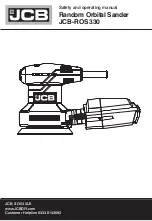
-3-
Safety Rules for Orbital Sanders
Unplug the sander before changing
accessories.
Accidental start-ups may occur
if sander is plugged in while changing an
accessory.
Use clamps or other practical way to
secure and support the workpiece to a
stable platform.
Holding the work by hand
or against your body is unstable and may
lead to loss of control.
If your tool is equipped with a dust bag,
empty it frequently and after completion
of sanding.
Be extremely careful of dust
disposal, materials in fine particle form may
be explosive. Do not throw sanding dust on
an open fire. Spontaneous combustion, may
in time, result from mixture of oil or water
with dust particles.
Always wear eye protection and a dust
mask for dusty applications and when
sanding overhead.
Sanding particles can
be absorbed by your eyes and inhaled easily
and may cause health complications.
Use special precautions when sanding
chemically pressure treated lumber, paint
that may be lead based, or any other
materials that may contain carcinogens.
A
suitable breathing respirator and protective
clothing must be worn by all persons
entering the work area. Work area should be
sealed by plastic sheeting and persons not
protected should be kept out until work area
is thoroughly cleaned.
Do not wet sand with this sander.
Liquids
entering the motor housing is an electrical
shock hazard.
Do not use sandpaper intended for larger
sanding pads.
Larger sandpaper will extend
beyond the sanding pad causing snagging,
tearing of the paper or kick-back. Extra paper
extending beyond the sanding pad can also
cause serious lacerations.
Disconnect the plug from the power source
and/or the battery pack from the power tool
before making any adjustments, changing
accessories, or storing power tools.
Such
preventive safety measures reduce the risk of
starting the power tool accidentally.
Store idle power tools out of the reach of
children and do not allow persons unfamiliar
with the power tool or these instructions to
operate the power tool.
Power tools are
dangerous in the hands of untrained users.
Maintain power tools. Check for misalignment
or binding of moving parts, breakage of
parts and any other condition that may
affect the power tool’s operation. If damaged,
have the power tool repaired before use.
Many accidents are caused by poorly
maintained power tools.
Keep cutting tools sharp and clean.
Properly
maintained cutting tools with sharp cutting
edges are less likely to bind and are easier to
control.
Use the power tool, accessories and tool
bits etc. in accordance with these instructions,
taking into account the working conditions
and the work to be performed.
Use of the
power tool for operations different from those
intended could result in a hazardous situation.
Service
Have your power tool serviced by a qualified
repair person using only identical
replacement parts.
This will ensure that the
safety of the power tool is maintained.
SM 2610952199 05-12_SM 2610952199 05-12 6/26/12 8:39 AM Page 3




































